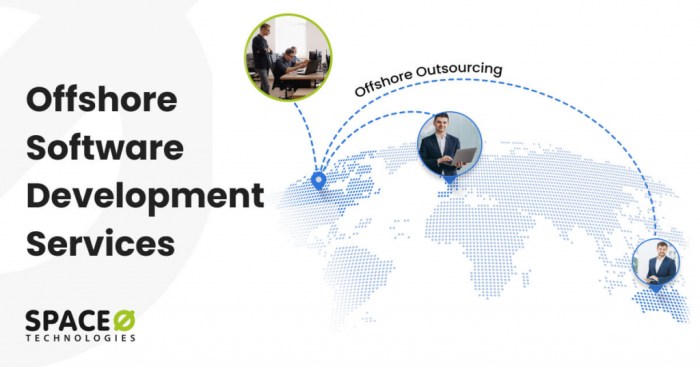Offshore software development company – In today’s globally interconnected world, businesses are increasingly leveraging the benefits of offshore software development. This strategic approach offers access to a vast talent pool, cost savings, and accelerated development cycles. However, navigating the landscape of offshore software development companies requires careful consideration. This comprehensive guide will delve into the intricacies of this practice, providing you with the knowledge to make informed decisions.

Source: tchtrends.com
Understanding Offshore Software Development
Offshore software development involves outsourcing the development of software applications or software components to a company located in a different country. This contrasts with nearshore development (outsourcing to a nearby country) and onshore development (using a domestic company). The primary drivers for choosing offshore development are often cost-effectiveness and access to specialized skills.
Key Benefits of Offshore Software Development
- Cost Savings: Labor costs in many offshore locations are significantly lower than in developed nations, leading to substantial budget reductions.
- Access to Specialized Skills: Offshore companies often possess expertise in niche technologies or programming languages that may be scarce domestically.
- Faster Time-to-Market: Many offshore companies operate around the clock, allowing for faster development cycles and quicker product launches.
- Scalability and Flexibility: Offshore teams can be easily scaled up or down to meet fluctuating project demands.
- Focus on Core Competencies: Outsourcing allows businesses to concentrate on their core competencies while leaving software development to specialists.
Challenges of Offshore Software Development
- Communication Barriers: Language differences and time zone variations can hinder effective communication and collaboration.
- Cultural Differences: Different cultural norms and working styles can lead to misunderstandings and conflicts.
- Quality Control: Ensuring the quality of the delivered software requires robust quality assurance processes and meticulous oversight.
- Security Concerns: Protecting sensitive data and intellectual property requires stringent security protocols and due diligence in selecting a vendor.
- Time Zone Differences: Effective project management requires careful planning to account for time zone discrepancies.
Choosing the Right Offshore Software Development Company
Selecting a reliable and competent offshore software development partner is crucial for project success. Here’s a checklist to guide your decision-making process:

Source: thinkmobiles.com
Factors to Consider When Selecting an Offshore Partner
- Experience and Expertise: Thoroughly review the company’s portfolio, client testimonials, and technology expertise.
- Communication and Collaboration: Assess their communication channels, responsiveness, and project management methodologies.
- Development Process: Understand their software development lifecycle (SDLC) and quality assurance procedures.
- Security Measures: Inquire about their data security policies, compliance certifications (e.g., ISO 27001), and intellectual property protection measures.
- Pricing and Contracts: Clearly define the scope of work, payment terms, and intellectual property rights in a comprehensive contract.
- Location and Time Zone: Consider the time zone difference and its potential impact on communication and collaboration.
- Team Composition and Skills: Assess the experience and qualifications of the development team members.
- Client References: Request references and contact previous clients to gather feedback on their experiences.
Popular Offshore Software Development Locations
Several countries have emerged as prominent hubs for offshore software development. Each location offers unique advantages and considerations:

Source: spaceotechnologies.com
Top Offshore Development Destinations
- India: Known for its large pool of skilled developers and competitive pricing.
- China: Offers a vast talent pool and cost-effective solutions, but communication can be challenging.
- Eastern Europe (Ukraine, Poland, Romania): Strong technical expertise, relatively good communication, and favorable time zones for collaboration with Western Europe and North America.
- Latin America (Mexico, Brazil, Argentina): Growing talent pool, relatively close proximity to North America, and often more affordable than North American developers.
- Philippines: Known for its English proficiency and a large pool of skilled developers.
Offshore Development Models
Different models exist for engaging with offshore software development companies:
Common Offshore Development Models
- Dedicated Development Team: A dedicated team works exclusively on your project.
- Project-Based Outsourcing: The company completes a specific project with a defined scope.
- Staff Augmentation: You augment your existing team with offshore developers.
Managing Offshore Software Development Projects
Effective project management is paramount for successful offshore software development. This involves:
Best Practices for Managing Offshore Projects, Offshore software development company
- Clear Communication: Establish clear communication channels and protocols.
- Regular Meetings: Conduct regular meetings to track progress and address issues.
- Project Management Tools: Utilize project management software to track tasks, deadlines, and progress.
- Version Control: Implement a robust version control system (e.g., Git) to manage code changes.
- Quality Assurance: Establish rigorous quality assurance processes to ensure high-quality deliverables.
Frequently Asked Questions (FAQ): Offshore Software Development Company
- Q: How much does offshore software development cost? A: Costs vary significantly depending on factors like location, team size, project complexity, and technology stack. Expect to pay less than onshore rates, but thorough budgeting is essential.
- Q: How can I ensure the quality of the software developed offshore? A: Implement a robust quality assurance process, including code reviews, testing, and regular communication with the development team.
- Q: What are the risks of offshore software development? A: Risks include communication challenges, cultural differences, quality control issues, and security concerns. Mitigation strategies include careful vendor selection, clear communication protocols, and robust quality assurance processes.
- Q: How do I choose the right offshore development model? A: The best model depends on your project needs, budget, and internal resources. Consider factors like project scope, timeline, and your need for dedicated resources.
- Q: What are the legal and contractual considerations? A: Ensure a comprehensive contract that clearly defines the scope of work, payment terms, intellectual property rights, and dispute resolution mechanisms.
Conclusion
Offshore software development offers significant advantages for businesses seeking to reduce costs, access specialized skills, and accelerate development cycles. However, careful planning, vendor selection, and effective project management are essential for success. By following the guidelines Artikeld in this guide, you can navigate the complexities of offshore development and leverage its benefits to achieve your business objectives.
Call to Action
Ready to explore the possibilities of offshore software development? Contact us today for a free consultation to discuss your project needs and find the perfect offshore partner for your business.
Key Questions Answered
What are the common risks associated with offshore software development?
Common risks include communication barriers, differing time zones, potential for quality control issues, intellectual property concerns, and legal and regulatory complexities.
How can I ensure the quality of work from an offshore development team?
Implement rigorous testing procedures, establish clear quality metrics, utilize version control systems, and maintain regular communication and progress reviews.
What legal considerations should I address when working with an offshore software development company?
Consider data privacy regulations, intellectual property rights protection, contract law differences, and tax implications in both your country and the company’s location.
How do I choose the right offshore software development company?
Research potential partners thoroughly, check references and client testimonials, assess their technical expertise, and ensure a clear understanding of their project management processes and communication strategies.
